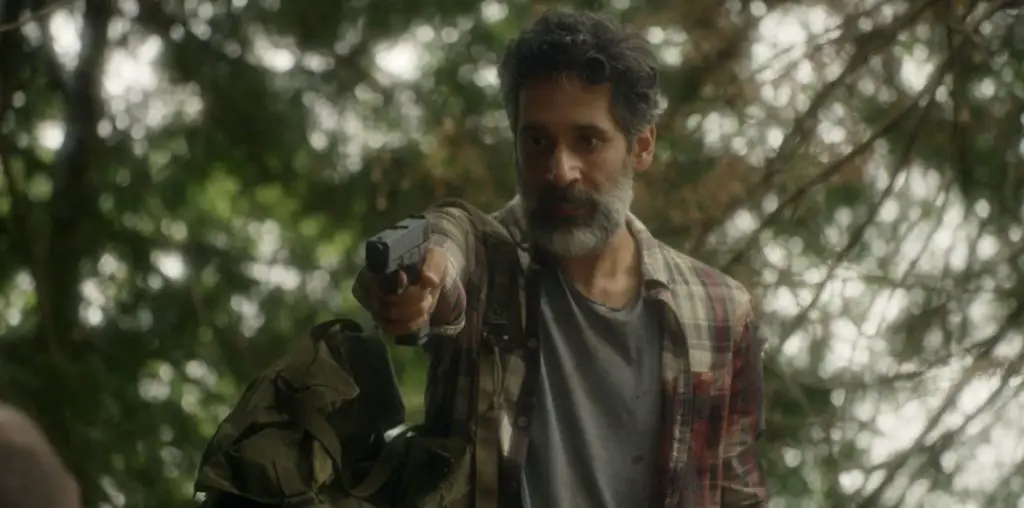
There are few things more painful to watch than an actor demonstrating “good” and “bad” acting in a motion picture.
Something in your brain rejects it, because it sort of forces you to own up to the fact that you’re watching a movie. This person is playing a character, and that character is “acting.” And if someone is “acting,” you’re reminded that the person “acting” is also ACTING, and you’re forced to judge the “acting” of the ACTING.
In the opening of “Darkness,” a man addresses the camera. He’s standing on a stage, performing a monologue, and later we learn this is the same stage on which a large part of the film takes place. The man on the stage is credited by the film as Edgar Allan Poe, though if he’s supposed to be an actor portraying him, or Poe reincarnated, or perhaps just the spirit of Poe seems to be left up to the viewer.
As the film continues, the audience sees what the stage is there for – a group of actors is performing a series of monologues written by Poe. They seem to just be reciting the stories, in black cloaks, wearing white and black makeup, as if they had decided that they were never going to make it as a Kiss cover band and instead turned to dramatic readings.
An actor, Lymon, is reciting “The Tell-Tale Heart” on the stage when he’s interrupted by a stagehand named Rex. Rex tells Lymon he’s doing it all wrong, and then proceeds to recite the same story. I guess the audience is supposed to feel that Rex does a much better job of it, but it comes off as pretty much the same quality.
Rex offers to go to Lymon’s place so he can help Lymon better understand Poe. Lymon accepts. This is odd, as we learn as the film progresses that Lymon seems to know a great deal about Poe already.
As the flick continues, an actress named Melissa gets involved, and something of a love triangle develops. A flirtation, maybe, with Rex, and an actual affair with Lymon. Or so it seems. But I’ll come back to that in a moment.
Lymon, Rex and Melissa all head off to a spooky house, where all sorts of things happen.
Lymon says that Poe’s body was removed from its original burial site and reburied on this land. Apparently, a guy who had his name changed to Usher was the one who bought the land and built the house on top of Poe’s new burial site. He would sacrifice children to Poe, and finally Poe… came back from the dead? Visited him as a ghost? Regardless, Poe cursed all of Usher’s male heirs.
Lymon and Rex break into the house, where Lymon produces a knife. He cuts his own arm, and then Rex’s, and they drink each other’s blood.
Then Melissa comes into the room, and there are some more stories, and they all fall asleep on the floor. Later that night, Rex wakes up and makes out with Melissa while she and Lymon are still sleeping.
If this all sounds very choppy and disconnected, that’s because it’s that way in the film. At the point I’ve stopped explaining the plot, we’re less than halfway through the movie, and instead of making more sense as it goes on, it slowly makes less and less.
Different elements come into play – Rex can hear a voice speaking to him, and he thinks it’s his dead father. Later, it is revealed that it is someone else, and Lymon starts to hear the voice as well.
Lymon has a ring that looks just like one that Poe used to wear, and though he keeps trying to get rid of it, the ring returns to him over and over again.
Melissa vanishes, a fact which seems to bother Rex and Lymon not all that much.
It should be mentioned, if it isn’t obvious already, that both Lymon and Rex are kind of nuts. Rex’s dialogue is about 99% statements that get you thrown in prison, or at least a very long lecture from a law enforcement official. At one point, he turns to Melissa and says, “I think we should have some kids. I’d treat you real nice, and I don’t think I’d ever choke you down to the floor.”
This is probably the nicest thing he says to anyone over the entire course of the film.
As the minutes tick by, there are more rehearsals, and more acting, and you start to wonder where the story is supposed to be going. There are dreams, or maybe visions, about horrible things happening in Usher’s personal slaughterhouse. People start seeing a red mist.
Characters are accosted by people who may or may not be there.
The final result is that the film makes no sense.
Perhaps the problem is that the film doesn’t seem to know what it’s trying to accomplish. As far as I know, there isn’t a Poe story called “Darkness,” and the film doesn’t credit any particular Poe story as being an inspiration.
One could argue that the filmmakers were going for a Poe-type feel, which the film does manage to achieve from time to time, assuming we’re talking about his horror stories.
Where the film fails is in capturing one of Poe’s greatest dictates. Besides being a writer of stories, Poe was also a critic. One of the things he said was important about fiction was that you choose the feeling you are trying to create, and then ensure that everything that happens in the story pushes the reader in that direction, until it meets some sort of logical end.
This film, instead, opts to push the viewer in no direction at all, and then come to an end that contains no logic.
